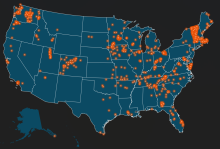
According to a recent report in the Jackson Sun, the city of Jackson, Tennessee is now the seventh “Gig City” in the state of Tennessee. Jackson Energy Authority (JEA), Jackson’s municipal utility received the special recognition at a January business summit. The Sun focuses on several existing and expected economic benefits that accompany municipal gigabit connectivity.
“These ultra-fast Internet speeds will help to assure innovation as it relates to the next generation of education, medical care, public safety and economic development,” JEA CEO John Ferrell said.
Ferrell also noted that ultra-fast Internet connectivity benefitted businesses in the Jackson community by allowing them to avoid excess inventory while still being able to provide customers with fast access to physical products when they need them.
"A good example is where an automotive supply company produces a part for a car at one plant — such as an interior headliner — and ships that part to the assembly plant to be installed in the car," Ferrell said. "Many times, this part is produced on the same day at one plant that it is installed at another plant."
Community leaders in Jackson hope their new Gig City status can help them to gain the same kind of economic development benefits that have come to places like Chattanooga, Tullahoma, and Morristown over the past several years. EPB told the Sun:
"The economic impact has been huge," J. Ed. Marston, vice president of the Electric Power Board in Chattanooga, said. "New companies have moved to Chattanooga, and a lot of investors, outside investors, are looking at Chattanooga."
Our report, Broadband at the Speed of Light: How Three Communities Built Next-Generation Networks, delves into Chattanooga’s story. Where communities invest in municipal networks, economic development almost always follows. Check out our Municipal Networks and Economic Development page for more examples.
The State of Tennessee now has nearly 200 data and call centers with more than 34,000 employees. A 2013 article from Business Climate magazine credits digital and fiber-optic networks as the reason why.
We wrote about the Jackson Energy Authority’s community broadband efforts as far back as 2008 when BBPMag’s FTTH Deployment Snapshot showed that JEA’s network had saved the community over $8 million already.
As we reported in October of 2014, the JEA is upgrading the network to gigibit service over a three year period, with estimates that service will cost less than $100 per month. The first round of upgrades began earlier this year. JEA is spending around $8-10 million on the current upgrades. The original network build out in 2003 required the JEA to borrow funds but the current upgrades are funded through regular cash flow and require no borrowing.
Jackson's Mayor Jerry Gist already sees the benefits to his city when a company comes to look at potential building sites in the area:
"Many sites are eliminated because of technology," Gist said. "This puts us in a select group across the nation that has the capability to provide fast (Internet) service to residents and businesses. We're ahead of many, many other cities across the country, and it's a huge asset.”







